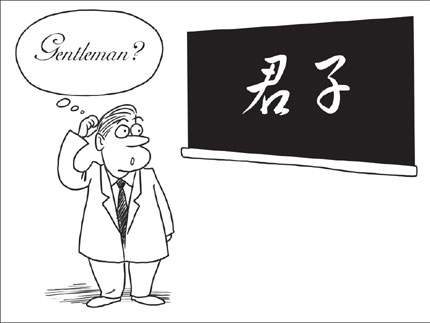
Illustration by Zhou Tao
Most people believe that the secret to promote Chinese culture is to have as many foreigners as possible studying the Chinese language.
There is a better way.
The difference between promoting and inhibiting one's culture often lies in "translation." All writers should be aware of the unwritten law of "cultural property rights": WHEN to translate, WHAT translation does, and WHERE to avoid it.
The English language is often hailed as the "international language," but it is not the global language. In fact, the global language will have to adopt tens of thousands of non-European concepts from China, India, and Japan. The list goes on.
As I write this, great efforts are made by Chinese scholars to promote East Asian terms into the global lexicon - Chinese words like tianxia, shengren and junzi, and even the mythical long.
The reason is simple: Scientists so far may have indexed the animal and plant kingdoms, and the material world. But the taxonomization of culture has only just begun.
Misleading translations
The main task for Chinese artists, writers, journalists, and academics (no matter how international they are), as I see it, is to choose the correct Chinese names and terms each and every time over misleading English translations. Why?
Because, just as in real life, if we give our names, ideas, and inventions away to another group, that group might quickly put another name to it and thereby automatically obtain what the Germans call deutungshoheit - the sovereignty over the definition of thought.
It is surprising to me that few have noticed this before: People fight over brand names, patents, publications (eg, who said what first), and intellectual property rights; yet when it comes to a token of their own cultural inventiveness, many Asians tend to think first about how Americans will describe this.
Translation is the oldest profession. It is reducing the world to what we already know. In this digital age however, we have the computational capacities to expand our knowledge systems. We can begin to find the "untranslatables" in each culture and return them to "World history."
Most readers in the West have heard about Japanese concepts like sushi, sumo, Zen, tsunami, manga, anime, and the Tenno. Those terms are part of the Japanese socio-cultural originality; they couldn't be translated into European languages without loosing their intended meanings, and thus were adopted.
Finding the untranslatable
Chinese, too, should be encouraged to go out and find the untranslatable words of Chinese origin, and, if they can, forbid themselves the way of all-too-convenient Western translations.
As a golden rule, each and every culture holds valuable information for all the others. However, most foreign terms that were adopted in the West come from the realms of entertainment or aesthetics, like kungfu or fengshui.
However, in the fields of politics, economics, the humanities and social sciences, the "global language" is kept virtually Chinese-free. It need not to be.
China and Japan are not alone. India, the other ancient civilization, wants her stake hold in global language, too. Think about Hindu concepts like avatar, guru, pundit, karma, and yoga that have found their way into the global lexicon.
Nations cannot expect all Westerners to study Chinese or any other foreign language in all its complexity of vocabulary, grammar, and etymology. But what each man of letters can do is to promote China's key concepts, names and terminologies to the outside world. Let them know what a zhongguo meng (China Dream) is.
It won't be easy to stand up against hundreds of years of translation history. But it is feasible that it can be done once people become aware that the vocabularies of the world's languages add up, they don't overlap.
We recommend:
